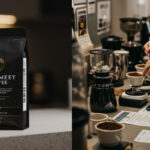
Why Do Americans Love Traditional Coffee? Exploring Its Timeless Appeal
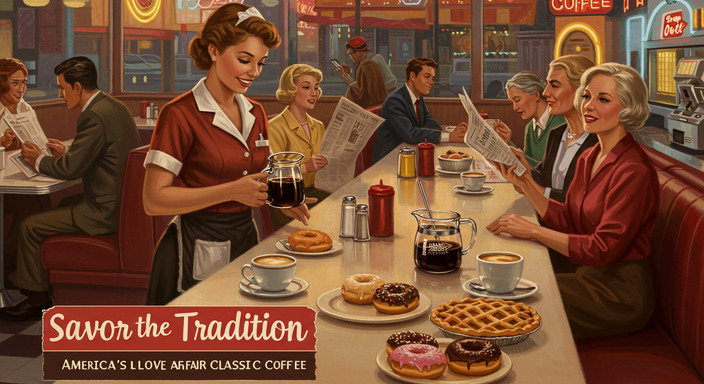
Table of Contents
ToggleThe History of Traditional Coffee in America
The Origins of Coffee in American Culture
Long before lattes and cold brews became trendy, coffee was already brewing its way into the fabric of American life. Coffee first arrived in the colonies in the mid-1600s, brought by European settlers who cherished the drink for its energizing properties. By the 18th century, it had become a staple, especially during pivotal moments like the Boston Tea Party in 1773, when colonists famously turned to coffee as a patriotic alternative to tea. This early adoption laid the groundwork for coffee’s enduring role in American culture.
How the Diner Coffee Tradition Shaped Modern Preferences
The 20th century saw the rise of the American diner, where coffee became a symbol of community and comfort. Diners served up steaming mugs of strong, straightforward coffee, often refilled without question—a tradition that still resonates today. This diner-style brew emphasized simplicity and accessibility, shaping the preferences of generations. It wasn’t about fancy roasts or complex flavors; it was about the ritual of sharing a warm cup with friends, family, or even strangers at the counter. This love for unpretentious, hearty coffee continues to influence how many Americans enjoy their daily cup.
The Role of Coffee in Historical American Moments
From the Civil War to the World Wars, coffee has been a steadfast companion during some of America’s most challenging times. Soldiers relied on coffee for comfort and alertness, and it became a symbol of resilience on the home front. During the Great Depression, affordable coffee was a small luxury that brought people together. Even today, coffeehouses serve as gathering places, echoing their historical role as hubs for conversation and connection. This enduring presence underscores coffee’s ability to adapt and remain relevant through the ages.
| Era | Coffee’s Role |
|---|---|
| 18th Century | Patriotic symbol during the American Revolution |
| 19th Century | Staple in frontier households and Civil War camps |
| 20th Century | Symbol of comfort in diners and wartime morale booster |
Whether it’s a cup enjoyed at a bustling diner or a quiet moment at home, traditional coffee remains a beloved part of the American experience. Its history is steeped in warmth, resilience, and shared humanity—qualities that continue to brew in every sip.
The Comfort of Simplicity
The Timeless Allure of Black Coffee
There’s something undeniably comforting about a cup of strong, uncomplicated black coffee. Its bold flavor, unclouded by cream or sugar, has been a steadfast companion to millions of Americans for generations. It’s not just a beverage; it’s a ritual, a moment of clarity in the morning rush or a quiet pause in the afternoon. The simplicity of black coffee speaks to a deeper appreciation for the essence of the bean, unadorned and pure—a reminder that sometimes, less truly is more.
Nostalgia in Every Sip: Brewing Methods of Yesteryear
For many, the aroma of coffee brewed in a drip coffee maker or the rhythmic bubbling of a percolator evokes a sense of nostalgia. These methods, though simple, carry the weight of tradition. The drip coffee maker, a staple in kitchens across the nation, delivers a familiar, consistent brew that has graced breakfast tables for decades. Meanwhile, the percolator, with its old-world charm, brings to mind family gatherings and Sunday mornings filled with laughter and warmth. These brewing methods are more than just tools—they’re vessels of memory, connecting us to the past in a tangible, aromatic way.
Bridging Generations Over Coffee
Traditional coffee has a unique ability to weave itself into the fabric of family life, creating bonds that span generations. Stories are shared over steaming cups, recipes are passed down, and the act of brewing becomes a cherished tradition. Whether it’s a grandparent teaching a grandchild how to measure the perfect amount of grounds or a parent sipping coffee while their teenager takes their first tentative sip, these moments are imbued with connection. The simplicity of traditional coffee allows it to transcend age, becoming a shared language of comfort and love.
Coffee as a Daily Ritual
The Morning Brew: A Wake-Up Call Across America
For millions of Americans, the day doesn’t truly begin until that first sip of coffee touches their lips. The aroma of freshly brewed coffee is a universal signal that it’s time to rise and shine. Whether it’s a quick pour-over before rushing out the door or a leisurely cup savored on the porch, coffee is the cornerstone of morning routines. It’s not just about the caffeine—it’s about the ritual, the quiet moment of preparation, and the promise of a fresh start. From bustling cities to sleepy small towns, the morning coffee ritual is a shared experience that unites us all.
Coffee Breaks: A Sacred Pause in the Workday
In the hustle and bustle of American workplaces, the coffee break is a cherished tradition. It’s more than just a chance to refuel—it’s a moment of respite, a time to step away from the desk, gather with colleagues, and recharge. Whether it’s a quick trip to the office coffee machine or a walk to the local café, these breaks are a reminder to slow down and breathe. In a culture that often prioritizes productivity, the coffee break is a small but powerful act of self-care. As the saying goes, “A coffee break is a mini-vacation for the soul.”
Sharing a Pot: Coffee as a Social Connector
Few things bring people together like a pot of coffee. Whether it’s a family gathering around the kitchen table or friends catching up at a diner, coffee is the glue that binds these moments. Sharing a cup fosters conversation, laughter, and connection. It’s a simple yet profound way to show care and hospitality. In many households, the act of brewing a pot of coffee is a gesture of warmth and welcome. As the steam rises and the cups are filled, stories are shared, bonds are strengthened, and memories are made. Coffee isn’t just a drink—it’s a shared experience that brings people closer.
Cultural Significance of Traditional Coffee
Regional Coffee Styles: A Reflection of American Diversity
From the bold, dark roasts of the Pacific Northwest to the sweet, chicory-infused brews of New Orleans, traditional coffee styles across the United States are as varied as the people who drink them. Each region has its own unique take on this beloved beverage, reflecting local tastes, histories, and cultural influences. In the South, for instance, coffee is often served with a touch of hospitality, while in the Northeast, it’s a no-nonsense companion to fast-paced city life. These regional differences not only highlight America’s diversity but also celebrate the shared love for coffee that unites us all.
Symbolism of Coffee in American Literature and Film
Traditional coffee has long been a symbol of connection, contemplation, and comfort in American storytelling. In literature, it often serves as a backdrop for intimate conversations or moments of introspection. Think of the diner scenes in Jack Kerouac’s On the Road, where coffee fuels both the body and the spirit of adventure. In film, coffee is a recurring motif in classics like Pulp Fiction, where it’s more than just a drink—it’s a ritual that brings characters together. These portrayals underscore coffee’s role as a cultural touchstone, weaving it into the fabric of American narratives.
Coffee’s Role in Community Gatherings and Holidays
Whether it’s a family breakfast on Christmas morning or a casual meet-up at a local café, traditional coffee has a way of bringing people together. It’s the centerpiece of countless gatherings, from holiday celebrations to everyday moments of connection. During Thanksgiving, for example, a pot of coffee often accompanies pumpkin pie, fostering warmth and togetherness. In small towns, coffee shops serve as community hubs where neighbors catch up and share stories. This communal aspect of coffee highlights its enduring role as a catalyst for connection, making it more than just a drink—it’s a tradition that binds us.
The Enduring Appeal of Diner-Style Coffee
A Timeless American Staple
There’s something undeniably comforting about the aroma of diner coffee—earthy, unpretentious, and relentlessly familiar. Unlike the meticulously crafted espresso drinks of modern cafés, diner coffee thrives in its simplicity. It’s a drink that doesn’t demand attention but somehow earns it through sheer reliability. Whether served in a thick ceramic mug or a classic glass carafe, its no-nonsense appeal transcends generations. This is coffee as it was meant to be enjoyed: hot, strong, and always within arm’s reach.
Unfussy, Bottomless, and Satisfying
Part of diner coffee’s charm lies in its unapologetic accessibility. Here, there are no obscure brew methods or single-origin labels—just endless refills of a brew designed to keep conversations flowing and dishes lingering on Formica tabletops. The magic is in the details:
- No waiting: Poured before the menu even hits the table.
- No pretenses: Cream, sugar, or black—each sip feels like permission to exhale.
- No rush: A cup that’s refilled with a smile, no questions asked.
Hospitality in Every Sip
Diner coffee is more than a beverage; it’s a lesson in American hospitality. The waitress who remembers your “usual” or the cook who sends out an extra slice of pie with your third cup—they’re all part of the ritual. This coffee isn’t just fuel; it’s an invitation to pause, to connect, and to feel at home. In a world of fleeting trends, diner coffee remains a steadfast reminder that sometimes, the simplest traditions are the ones worth holding onto.
“It tastes like leather booths, shared stories, and mornings where time slows down just enough.” — A Regular at Lou’s Diner, Chicago
Coffee and American Identity
Simplicity and Reliability in Every Sip
Traditional coffee, with its uncomplicated preparation and timeless flavor, mirrors the values of simplicity and reliability deeply ingrained in American culture. Whether it’s a steaming cup of black coffee or a classic drip brew, there’s no need for frills or fuss—just a straightforward, dependable experience. This consistency resonates with Americans who value honesty and authenticity in their daily lives. It’s a reminder that the best things often come without complexity, just like the comforting aroma of coffee brewing at dawn.
The American Work Ethic: Fueled by Coffee
Coffee has long been the unsung hero of the American work ethic. From factory floors to corporate offices, it’s the beverage that powers productivity and perseverance. The ritual of reaching for a cup of coffee to start the day or push through the afternoon is a testament to its role as a companion in hard work. It’s not just a drink—it’s a symbol of dedication and determination, qualities that have shaped the nation’s identity. As the saying goes, “America runs on coffee,” and it’s a truth that underscores the deep connection between the beverage and the pursuit of progress.
A Symbol of Home and Comfort
For many Americans, coffee is more than a beverage—it’s a symbol of home and comfort. The smell of coffee brewing in the kitchen evokes memories of lazy Sunday mornings, family gatherings, and cherished conversations. It’s a constant in a world that often feels uncertain, offering a sense of familiarity and warmth. Whether it’s a diner mug shared with friends or a favorite mug cradled in solitude, coffee is a reminder of the simple joys that make life meaningful. It’s a thread that weaves through the fabric of American life, connecting generations and creating moments of calm in the chaos.
“Coffee is the common thread that binds us, whether we’re at home, at work, or on the road. It’s a ritual, a comfort, and a source of strength.”
The Future of Traditional Coffee
In a world that often seems obsessed with the next big thing, traditional coffee remains a steadfast companion—timeless, comforting, and deeply rooted in our lives. As modern coffee culture evolves, it’s fascinating to see how classic coffee styles are not just surviving but thriving. The future of traditional coffee is a blend of nostalgia and innovation, proving that some things never go out of style.
How Modern Trends Are Embracing Classic Coffee Styles
Despite the rise of artisanal lattes and cold brews, many modern coffee enthusiasts are rediscovering the charm of traditional coffee. Cafes across the country are incorporating retro brewing methods like pour-overs and French presses into their menus, appealing to both older generations and younger drinkers seeking authenticity. Even the humble drip coffee maker, a staple of American kitchens, is being reimagined with sleek designs and smart technology to fit seamlessly into contemporary homes.
This resurgence isn’t just about taste—it’s about connection. Traditional coffee styles remind us of simpler times, whether it’s the smell of a fresh pot brewing in the morning or the warmth of a diner-style cup shared with friends. As the world becomes more fast-paced, these moments of comfort and familiarity feel more precious than ever.
The Resurgence of Retro Brewing Methods
From percolators to Moka pots, vintage brewing methods are making a comeback. Coffee lovers are drawn to these methods not only for their rich, bold flavors but also for the ritual they bring. Brewing coffee by hand—measuring the grounds, watching the water drip, and waiting for the perfect extraction—creates a sense of mindfulness that’s often missing in our hurried lives.
These methods also offer a deeper appreciation for the craft of coffee. As people become more curious about where their coffee comes from and how it’s made, traditional brewing techniques provide a tangible link to the process. It’s a way to honor the history of coffee while making it uniquely their own.
Why Traditional Coffee Will Always Have a Place in American Hearts
At its core, traditional coffee is more than just a beverage—it’s a cultural touchstone. It’s the smell of a fresh pot waking you up on a Monday morning, the cup you share with a loved one during a heartfelt conversation, or the comforting warmth you hold on a cold winter day. These small, yet profound, moments are why traditional coffee will never fade away.
Its simplicity is its strength. While specialty coffee trends come and go, traditional coffee remains accessible, affordable, and universally loved. It’s a reminder that sometimes, the best things in life are the ones we’ve always known.
FAQ: The Future of Traditional Coffee
- Q: Will traditional coffee ever be replaced by new trends?
- A: While new coffee trends will continue to emerge, traditional coffee’s timeless appeal ensures it will always have a place in our lives. Its familiarity and simplicity resonate across generations.
- Q: Why are retro brewing methods becoming popular again?
- A: Retro brewing methods offer a hands-on, mindful approach to coffee-making that appeals to those seeking a deeper connection to their brew. They also deliver rich, bold flavors that many coffee lovers crave.
- Q: How can I incorporate traditional coffee into my modern routine?
- A: Start with simple steps like using a French press or a pour-over for your morning coffee. Experiment with different beans and brewing techniques to find what suits your taste best.
As we look to the future, one thing is clear: traditional coffee is here to stay. It’s a testament to the enduring power of comfort, connection, and simplicity. Whether you’re sipping a cup in a bustling city café or in the quiet of your own kitchen, traditional coffee will always be there to warm your heart and fuel your day.
is a writer and editor at Coffee With Finance, blending her love for coffee, personal finance, and visual storytelling. She crafts engaging articles, curates site images, and shares brewing tips, bean origins, and practical money advice. Anna believes that managing finances, like making great coffee, should be intentional and rewarding — bringing clarity, warmth, and beauty to every story she tells.

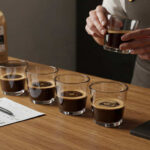








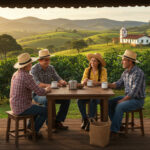


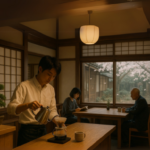




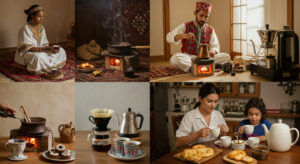



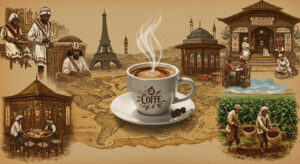

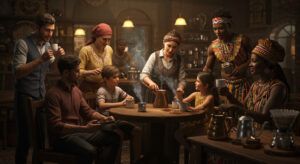
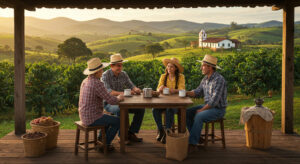

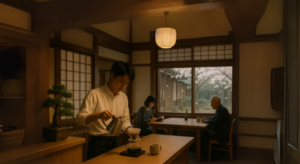
Post Comment